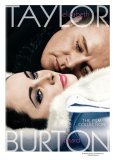| Reviews & Columns |
|
Reviews DVD TV on DVD Blu-ray 4K UHD International DVDs In Theaters Reviews by Studio Video Games Features Collector Series DVDs Easter Egg Database Interviews DVD Talk Radio Feature Articles Columns Anime Talk DVD Savant Horror DVDs The M.O.D. Squad Art House HD Talk Silent DVD
|
DVD Talk Forum |
|
|
| Resources |
|
DVD Price Search Customer Service #'s RCE Info Links |
|
Columns
|
|
|
Elizabeth Taylor and Richard Burton: The Film Collection
It's difficult today to comprehend the magnitude of publicity that was generated when Richard Burton took Elizabeth Taylor as his lover. Co-starring in 1963's Cleopatra, the world was treated to daily screaming headlines of their respective infidelities for literally months, while location shooting dragged on in Italy. With the rise of the Italian paparazzi supplying pictures, newspapers all over the world were in a feeding frenzy to get the next scoop on the torrid love affair. Taylor, arguably the most famous actress in the world and already a brazen symbol of nonconformity in her home country (she had infamously broken up the "American sweethearts" marriage of actress Debbie Reynolds and singer Eddie Fisher -- now her husband), further enraged early 1960s America by cavorting with happily married Richard Burton. Burton, a name movie star, but professionally not in the same league as Taylor, was known to fool around on previous film shoots, only to return each time to his patient wife. From the start, their love affair (and subsequent marriage) and their careers would be inextricably entwined. Taylor and Burton would choose film projects that reflected their passionate addiction to each other, and audiences would flock to their films to try and catch a glimpse of what they suspected might be going on behind the Burton's closed doors. They were, quite simply, the most famous couple on Earth in the 1960s.
And with that dazzlingly, overwhelming fame, came equal doses of admiration (mostly from fans) and scorn (from critics and social commentators). The Burtons, through their own willing embrace of notoriety and excess, became, by the end of the decade, symbols of an outdated era: glamorous movie stars with too much money, too much fame, and increasingly, too many movie flops. Warner Home Video gathers together four fascinating films from the Burtons' glory years in the Elizabeth Taylor Richard Burton: The Film Collection. This five-disc box set traces their evolution as a screen couple from the first blush of their incredible on-screen chemistry (The V.I.P.s), to ostentatious self-parody (The Sandpiper), to their greatest artistic triumph (Who's Afraid of Virginia Woolf?), to the first indication of their eventual commercial and critical downfall (The Comedians).
THE V.I.P.s
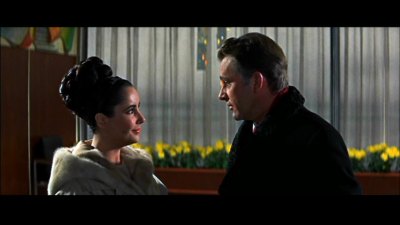
Although Cleopatra was actually shot prior to The V.I.P.s, film audiences first saw the notorious couple in this glossy, well-acted soap opera. Conceived as a quick follow-up to Cleopatra to capitalize on the unprecedented media coverage of that epic, The V.I.P.s was shot, edited and released in theatres while Cleopatra was still languishing in post-production. Its financial success no doubt took some of the sting out Cleopatra's box office returns, after audiences felt sated in their desire to finally see the couple they had been reading about for an entire year. Both actors come off much better here than in that well-intentioned epic misfire, cementing forever in the public's eye the peculiar feeling that these particular performers were largely acting out their own private passions and squabbles on the screen.
At an English airport, various V.I.P.s ("very important people") wait out a dense fog bank which has grounded all flights, with each character's emotional or financial security severely threatened by the unforseen delay. Les Mangrum (Rod Taylor) is the owner of a small tractor firm, threatened by a hostile takeover. Unfortunately, he has written a check without sufficient funds (a felony in England) to calm a nervous investor, and his delayed flight to New York may cost him not only his company, but also a term in prison. Max Buda (Orson Welles) is an internationally known film director who scorns lightweight entertainments, but who also knows how to hide his money from the government. Unfortunately, due to arcane British tax laws, if Buda's plane is still grounded, and he stays on English soil past the stroke of midnight, he will lose one million dollars to the British tax collectors. The Duchess of Brighton (Margaret Rutherford) is on her way to Florida, leaving behind her beloved estate to find a job. Land rich and money poor, The Duchess realizes that when her plane leaves for America, she might very well lose her home. And finally, Frances Andros (Elizabeth Taylor), beautiful, glamorous wife of multi-millionaire shipping tycoon Paul Andros (Richard Burton), has decided to leave her husband for handsome gambler and womanizer, Marc Champselle (Louis Jourdan). Can Frances and Marc spirit away to New York, before desperate, violent Paul does something drastic?
I know it's terribly out of fashion to admit this, but I like to see beautiful, rich people suffer through their exciting, dramatic lives on the screen. Of course, it's fantasy-laden and voyeuristic (and maybe even a tad masochistic), but it's what use to drive Hollywood for decades: glamourous stars emoting on the screen for our secret identification and enjoyment. It was entertaining. And purely entertaining films are often looked at with suspicion by most critics; there's a marvelously ironic moment in The V.I.P.s where Orson Welles flatly states that the purpose of modern cinema is not to entertain. Coming from the genius director, in the context of a splashy soap opera, is a good indication of the generally well-written screenplay. Screenwriter Terence Rattigan (The Browning Version, Separate Tables) along with frequent collaborator, director Anthony Asquith, know how to keep the various plot lines bubbling along, giving the actors smart, punchy lines to say to keep us amused while we take in the luxurious sets and gorgeous costumes. The comedic characters come off somewhat better, with Rutherford (she won the Best Supporting Oscar for her role, here) and Welles keeping things light for the audience. Rod Taylor is perfectly cast as the rough-and-tumble Australian businessman; his scenes with his secretary Miss Mead (Maggie Smith), have a good coarse/tender interplay. Of the main romantic lead triangle, surprisingly, Louis Jourdan comes out on top, giving a fairly layered performance as the film's only truly tragic figure. Unfortunately, as the catalyst between two strong male performances, Elizabeth Taylor is given little to do in the film but look stunning (which she does), while Burton perfects his cultured, world-weary, desperately lonely, romantic figure that made women in the audience secretly swoon inside.
It probably didn't hurt The V.I.P.s' box office that the story arc of Taylor's and Burton's characters involves infidelity. Clearly, they were smart enough to pick a film that would capitalize on their recent headline-grabbing affair, and they certainly do well by it. There is an unmistakable, indefinable chemistry between the two of them that works here. There have been many examples of off-camera lovers who were unable to transfer that buzz between them onto the big screen (I've always thought Paul Newman and Joanne Woodward were good examples of this), but not the Burtons. Whatever was going on behind the scenes, was showing up on the screen, too, and audiences loved it. Filmed in the stately, old-fashioned tradition of Grand Hotel, The V.I.P.s is an entertaining trip back to the kind of films that Hollywood is incapable of making today.
THE SANDPIPER
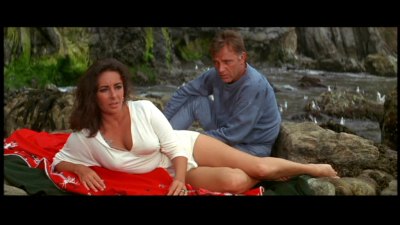
It's difficult to know where to start with MGM's 1965 hyped-up potboiler, The Sandpiper. Perhaps the best way to get at it is to remember that it was written by two of film's most respected screenwriters; Dalton Trumbo (Spartacus, Lonely are the Brave) and Michael Wilson (The Bridge on the River Kwai, A Place in the Sun), and directed by that genuine artist, Vincente Minnelli (An American in Paris, Gigi). You can't get much higher caliber talent than that behind the camera. But if you listened to critics at the time (Pauline Kael penned a particularly cruel - yet hysterical - review), you'd think it was all the Burtons' fault for The Sandpiper's turgid, ridiculous final form. To many people in the 1960s, The Sandpiper was their Showgirls.
Certainly it's junk. That's a given. But whatever were Taylor and Burton to do with the silly characters they were asked to enact? Taylor is Laura Reynolds, a "free spirit" single mother who lives in a spectacular beach cabin on the picturesque coast of Big Sur, California. Her son, who perhaps has had enough free thought, just gunned down a young fawn for the fun of it. Hauled before a judge, the boy is sentenced to go to religious school (I kid you not). When Laura objects (along with a smug, self-satisfied lecture about Big Things like "freedom" and "society" and "the individual"), the judge threatens to take the boy away from her. At this point, it's a toss-up as to who's more unbelievable. Thankfully, that decision is made moot by the appearance of Richard Burton as a priggish Episcopalian reverend, Dr. Edward Hewitt, who runs said religious school. Apparently stunned into lust at the very first sight of Taylor, Burton spends the remainder of the first act sniffing around Laura, while cursing himself for being so weak.
Myriad complications ensue for Dr. Hewitt, including a possible stoppage of funds for his new chapel because slimy Building Fund manager Ward Hendricks (Robert Webber) had a two year affair with Laura. Not helping on Laura's side is incredibly muscular artist/beatnik/no-goodnik Cos (Charles Bronson), who maybe desires Laura...or Dr. Hewitt (trust me, I've seen the film at least five times, and I still can't figure out his character). Anyway, he's causing trouble between Dr. Hewitt and Laura, who, by the way, have consummated their forbidden union of religious fusspot and atheistic kook. Here, we're treated to many scenes of Dr. Hewitt and Laura enjoying the splendor of the Big Sur locations, while her son, and his wife (Eva Marie Saint) are conveniently forgotten. Naturally, someone blows their cool and publically rats out the couple, which causes a stink with Edward's marriage. Will they stay together? Will their beliefs tear them apart?
It's almost impossible to truly hate The Sandpiper; it's such a gawd awful mess that it's practically endearing in its ineptitude. Not much makes sense in The Sandpiper, particularly the characters' motivations. Burton is supposed to be transformed somehow by the very sight of Taylor, but since the screenwriters and director failed to present even one significant scene between Burton and his wife, it's impossible to know what he's running away from (poor Eva Marie Saint - she's never been this badly utilized in a film, before or since). As for Taylor, she's all over the map as far as her emotions go. She's supposed to be contemptuous of Burton's prude, but then, with absolutely no explanation, she states she wants him. Huh? As for Bronson, his character may have suffered the same fate as Robert Redford's main lead in Natalie Wood's Inside Daisy Clover; perhaps conceived as a homosexual, the character may have been whittled down to just enigmatic. It's hard to say, but watching him constantly needling Burton (as well as tussling with him), while ignoring Taylor's ample, naked body, says a lot -- on the Q.T., of course.
Minnelli, down to his last gasp as a truly relevant director (he had just directed another soulless mess, Goodbye, Charlie), cannot seem to get a handle on the material. Whether he was shocked to be suddenly directing two of Hollywood's biggest players (his previous stars were Debbie Reynolds and Tony Curtis - both soon to reach their sell-by dates), or he actually read the script, either way, his noted light touch is nowhere to be found. Granted, it must have been impossible to lift this elephantine romance, loaded down with endless "socially relevant" gobbledygook courtesy of Trumbo and Wilson. It probably didn't help the flow of the film to have to cater to the Burton's rather eccentric demands to film the California interiors in Paris, either (a demand made necessary by their tax status). Any sense of verisimilitude that some of the Big Sur locations impart are lost once we're stuck in the phony, claustrophobic interiors. Still, with whoppers like, "I want you, Laura. I want you," "Dear God....give me....emptiness," "I cannot dispel you from my thoughts," "I've lost all my sense of sin," and my favorite, "I can't help it, but you're a creep! A terrible creep!" The Sandpiper will definitely keep you chuckling throughout its glossy tribulations. Oh, and if you think audiences were in on the joke, too - forget it. The film was a socko smash with ticket buyers.
WHO'S AFRAID OF VIRGINIA WOOLF?
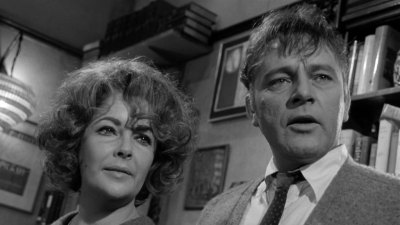
In one of the most stunning artistic comebacks in film history, the Burtons followed the daffy, hapless The Sandpiper with one of the finest films of the 1960s, showcasing certainly the best performances of their individual careers, while shocking audiences and critics with their ferocious, dazzling thesping.
The premise of the drama is deceptively simple. George (Richard Burton) is a harried, beaten, vicious college associate professor of History. He's married to the college's president's daughter, Martha (Elizabeth Taylor), a drunken, lecherous harpy. Following a college mixer for new staff, Martha invites smug new biology teacher Nick (George Segal) and his mousey wife Honey (Sandy Dennis) over to their ramshackle old house for a nightcap. What follows is harrowing, alcohol-soused night of "fun and games" as the couples tear at each other verbally, laying waste to all civility, while exposing and destroying long-held fantasies and lies.
Who's Afraid of Virginia Woof? finds Taylor and Burton at the absolute zenith of their film careers. Taylor, who won the Oscar for Best Actress here, unleashes a performance that no one expected from her. Largely seen as miscast for the role (far too young and pretty for the character's design), Taylor's makeup and weight gain aren't entirely successful in masking her beauty, but she more than covers for that in her near-savage portrayal of Martha, a college wife like you've never seen before, alternating from hurt little girl, to, as George puts it, a "cyclops," a "subhuman monster yowling at the door." She's a marvel to watch, being far more animated and involved with the script than her usual coolly erotic reserve, letting out the glorious vulgarian that lives within her. Surpassing her is Burton, who should have won the Oscar that year for his cornered, despondent George. Also thought to be miscast (the original Broadway George was played by mild-mannered Arthur Hill), Burton has several set pieces, particularly the "Bergin" story, that showcase his superlative line readings. Looking particularly seedy with his garishly-lighted pockmarked face and ratty sweater, while saddled with a character who's variously described as a "simp" and a "bog," Burton pulls the neat trick of evolving George from near-invisibility at the beginning of the film, to a vicious, repellent bully, beaten spiritually, but swaggering in his command of a abusive put-down. Verbally and physically assaulting his wife, while still drawing on our sympathy, Burton's George ultimately winds up to being something close to a savior. It's a tour de force for both actors.
First time helmer Mike Nichols, who at the time of filming was one of Broadway's most sought after directors, is a perfect match for the largely stage-bound material. As part of the former comedy team of Nichols and (Elaine) May, Nichols wisely lets the humorous lines from Edward Albee's play stay humorous; often, it's a remarkably funny film, with laugh-out-loud funny lines ("It's a familiar dance, monkey nipples; they both know it."). By letting the jokes be funny, the horror of the drama becomes even more pronounced; how can these two obviously intelligent, passionate, funny people, be such inhuman monsters to each other? Of course, that's the point of Who's Afraid of Virginia Woof?: the damage we do to each other, through unfulfilled hopes, through alcohol, through suspicion, through illusion and fantasy, through love and the lack of it. The ending of the film, which I won't reveal, is shattering for the first-time viewer, and leaves the audience emotionally spent after the rollercoaster ride of emotions they've just endured. Known at the time, I think, more for the sensationalist nature of the language used (there's a good case to be made that Who's Afraid of Virginia Woolf? put the final nail in the restrictive Production Code), rather than for the performances or drama, Who's Afraid of Virginia Woof? exists now as one of the seminal dramas of the modern screen. And its existence counterbalances every gauche public display the Burtons perpetrated, every ream of wasted newsprint devoted to their sometimes silly, outsized lives, and every mediocre film they made before and after its production. It is the peak of their collective and individual careers. And they would never recover from it.
THE COMEDIANS
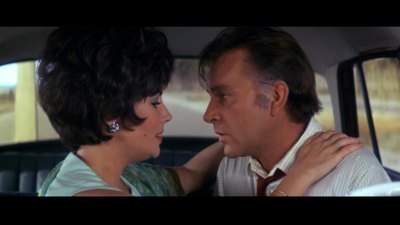
There was much talk about the Burtons' tumultuous life together, with many reports of uncontrolled drinking and violent arguments between the couple. Some people speculated that Taylor and Burton had taken their roles in Who's Afraid of Virginia Woolf? to heart, acting out the abusive characters in real life, in some bizarre homage to their greatest screen triumph. Others felt that Burton, although happy that his marriage to Taylor had catapulted him into the stratosphere of celebrity, was growing tired of the endless demands that fame brought from being married to the most famous woman in the world. By 1967, the Burtons were more than just a celebrity couple; they were an incorporated business, a money-making entity that demanded feeding with proposed co-starring film projects planned for the next several years. The Comedians would prove to be the first indication that as a business, the Burtons had already peaked with their audience.
The Comedians, based on the novel by Graham Greene (he also wrote the screenplay), tells the frightening story of "Papa Doc" Duvalier's Haiti, as experienced by an assortment of residents and visitors to the country. Richard Burton is Mr. Brown, the owner of an almost deserted hotel in Port-au-Prince, who has just returned to the country, after unsuccessfully looking for a buyer in New York City. He's having an affair with Martha Pineda (Elizabeth Taylor), the wife of foreign ambassador Manuel Pineda (Peter Ustinov). Traveling on the boat back to Haiti with Mr. Brown, is Mr. Jones (Alec Guinness), a shady, blustering military character with connections to the "Papa Doc" regime. Also on board are ex-Presidential Candidate (from the Vegetarian Ticket) Mr. Smith, traveling with his wife Mrs. Smith (Lillian Gish) to promote the vegetarian lifestyle in Haiti. Friends of Mr. Brown include Dr. Magiot (James Earl Jones), a friend of Brown's mother, and Henri Philipot (Georg Stanford Brown), an artist who longs to battle the evil "Papa Doc" regime. Representing the despotic government are the vicious thugs of the Tontons, led by Michel (Zakes Mokae), and aided by sadistic, corrupt police Captain Concasseur (Raymond St. Jacques).
Complications arise when Mr. Jones, who has been found out to be a gun runner whose partner absconded with the government's money, has to take refuge at the Pineda's embassy. Romantic jealousies arise when Mr. Brown, who cannot be happy in his affair with Martha, starts to imagine a similar affair between Mr. Jones and Martha. Henri, trusting that Mr. Jones could train rebels in the mountains, agrees to help spirit Jones away, with Mr. Brown's aid. But the vicious Tontons have different ideas about that plan.
The Comedians proved to be the first Burton-Taylor collaboration that lost money at the box office. At the time, it was considered slow and talky, with a failed script by Greene, and tentative direction by Peter Glenville (it would be his last film assignment). Much was made at the time that Burton received top-billing for the first time, and that Taylor took half her usual one million dollar salary to stay with Burton (she was nervous about letting Sophia Loren take the role). Seen now, it's quite an interesting film, with a tremendous, menacing atmosphere (aided immeasurably by the pulsating, driving score by Laurence Rosenthal) that comes close to approximating the random, violent nature of the Duvalier regime. Filmed in Dahomey, on the East African coast, Glenville is adept at creating a ever-increasing sense of violence and dread, utilizing open, brightly lit compositions at the beginning of the film, which get darker and ever-more cramped towards the end, when finally, Burton and Guiness are alone on the screen, illuminated only by flashlights. A nightmare gradually emerging from the last vestiges of civilization (a marvelous symbol of this is Roscoe Lee Brown's cultured newsman Petit Pierre, who graciously ignores the horrors surrounding him), Glenville's Haiti is a believable, frightening creation.
Less successful are the politics involved in the plot. A few swipes are made at the U.S., but Castro is held up as model of revolutionary politics (one wishes one could ask Greene if people drown floating on cars to get to Cuba, or to America). At one point, Ustinov says, "It's a horrifying world," and that, "Haiti's no different from life anywhere." Greene was never shy about his anti-American, pro-revolutionary politics, nor was Ustinov reluctant to slam the U.S. any chance he got, but this statement is beyond the pale. It was easy for Greene and Ustinov to attack the U.S., and praise dictators like Castro, from their palatial estates in Switzerland (I guess real estate was scarce in Haiti). It's these kind of looney leftist musings that spoil The Comedians. If Greene's purpose was to sit high up, and show that we are all "comedians," that we all "play drawing-room comedies in the black-out," then why does he stack the deck to one leftist side? If Greene wants to say that all people play out silly games of love and betrayal (Smith's unreasoning suspicions of Martha), and loyalty to ridiculous, out-dated notions (the Smiths' sad, out-of-place moral outrage at the jungle mentality of the Tontons; their belief that a vegetarian diet will calm violent societies), then where are his commendations of Henri, Dr. Maginot, and the rebels? Aren't their notions just as human, and therefore, just as flawed and biased as the others? Evidently, Greene wanted to appear universal, but in reality, he had an agenda - just like everybody else.
Burton and Taylor, unfortunately, are quite lost in all of this skullduggery. Taylor, supposedly playing a German (I dare anyone to place that accent before she identifies it), exists in the film only to provide torment for Burton. It's a poorly conceived part that offers nothing like the acting challenge that her previous Martha did in Who's Afraid of Virginia Woolf?. Burton fares better, but he's largely enervated, developing that patented far-off stare that he would use increasingly in his later movies (some said that was the result of increasing alcoholism). Guinness has a much flashier role as the braggart Mr. Jones, and he's quite good (although the ridiculousness of seeing him in blackface and drag pretty much shoots down all the goodwill he had previously earned). Ustinov is strangely calm for Ustinov, but then, he hasn't much to do here, except enact the good-hearted, suffering cuckold. Far better are the supporting players, including St. Jacques' cool deviltry, Stanford Brown as the earnest, knowing Henri, and a terrific showing by Douta Seck as Joseph, the barman. His performance in the Haitian voodoo ceremony is quite arresting. Why The Comedians failed with audiences is anybody's guess, but the downbeat nature of the romantic pairing, the relative scarcity of Taylor in the film, and the messy, chaotic politics of the piece probably doomed the picture from the start. The Burtons would go on to make several more pictures together, each one making less money than the last. They finished off the decade largely seen as unemployable as a screen team.
The DVDs:
The Video:
While no mention of print restoration is made on any of the discs, the Elizabeth Taylor Richard Burton: The Film Collection sports terrific new transfers. The V.I.P.s in particular looks quite good; earlier prints always tended towards a jaundiced yellow, but here, the colors look vividly true and rich. Equally sharp and clear are the transfers for The Sandpiper, Who's Afraid of Virginia Woolf?, and The Comedians. All transfers are presented in a letterboxed widescreen, enhanced for 16x9 televisions, with Who's Afraid of Virginia Woolf? presented in a matted widescreen, enhanced for 16x9 televisions transfer.
The Audio:
All of the soundtracks for the films in the Elizabeth Taylor Richard Burton: The Film Collection are presented in Dolby Digital English and French Mono, with The Comedians presented in English Mono only. All features are close-captioned; all special features are not close-captioned. Close-captioning in English, French and Spanish are provided for all the features, with Korean and Portuguese added for Who's Afraid of Virginia Woolf?
The Packaging:
The five discs in the Elizabeth Taylor Richard Burton: The Film Collection are stored in slim cases, which fit in a standard cardboard box set sleeve.
The Extras:
The extras included in the Elizabeth Taylor Richard Burton: The Film Collection are heavily weighted towards Who's Afraid of Virginia Woolf? -- the only title sold separately. This two disc special edition includes a new commentary by director Mike Nichols and Steven Soderbergh. I could have done without Soderbergh's comments, but Nichols has some insightful comments on the production of the film. There's also a commentary by cinematographer Haskell Wexler that has already appeared on the previous disc version of this title. Two new features appear here: Who's Afraid of Virginia Woolf?: A Daring Work of Raw Excellence, and Who's Afraid of Virginia Woolf?: Too Shocking for its Time. They provide good overviews of the impact of the film, and behind-the-scenes looks at the production. There's a 1966 interview with Mike Nichols, from NBC's Today show, which offers a unique look at the director right at the start of his film career. There's a fascinating screen test for Sandy Dennis (played with Roddy McDowall), as well as trailers for all of the films in this box set. That's important to remember; when you're looking at the other discs, and feeling cheated that they didn't include the trailers, remember that they're here on the Virginia Woolf? disc. There are no extras for The V.I.P.s, which is a shame because I'm sure there's archival footage somewhere at MGM for this heavily-promoted title. For The Sandpiper, there are two vintage featurettes -- The Big Sur, narrated by Richard Burton, and A Statue for The Sandpiper, featuring the artist who carved the redwood statue of Taylor, used in the film. These shorts will be familiar to regular viewers of Turner Classic Movies. For The Comedians, another short that's shown often on TCM, The Comedians in Africa, is offered.
Final Thoughts:
The Elizabeth Taylor Richard Burton: The Film Collection is a must-have collection of titles from one of the cinema's all-time most popular screen teams. While the quality varies from film to film, Who's Afraid of Virginia Woolf? is a certified masterpiece; The V.I.P.s is a glossy, entertaining piece of fluff; The Comedians is a wrong-headed but engrossing political potboiler; and The Sandpiper is...well, it's The Sandpiper -- it has to been seen to be believed. If you want to see real movie stars in action (as opposed to the pallid, shallow adolescents that populate the screen today), I highly recommend the Elizabeth Taylor Richard Burton: The Film Collection.
Paul Mavis is an internationally published film and television historian, a member of the Online Film Critics Society, and the author of The Espionage Filmography.


|
| Popular Reviews |
| Sponsored Links |
|
|
| Sponsored Links |
|
|
| Release List | Reviews | Shop | Newsletter | Forum | DVD Giveaways | Blu-Ray | Advertise |
|
Copyright 2024 DVDTalk.com All Rights Reserved. Legal Info, Privacy Policy, Terms of Use,
Manage Preferences,
Your Privacy Choices | |||||||









